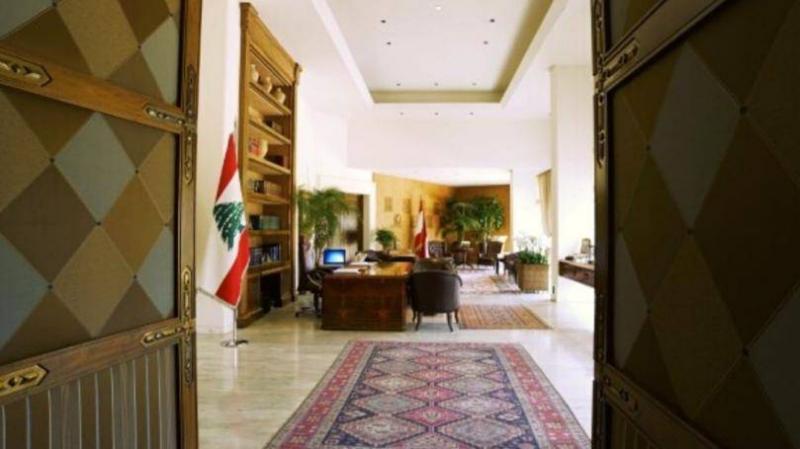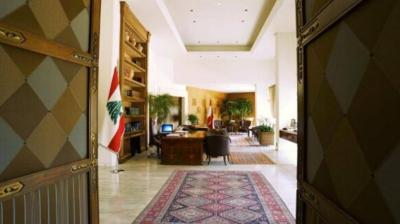In anticipation of Lebanon entering the constitutional period for electing a new President of the Republic, several Arab and foreign ambassadors have begun engaging with the main political forces in Parliament to explore their positions and readiness to complete the presidential election on time, and not postpone it beyond the current President Michel Aoun's term ending on October 31. This delay would lead to negative repercussions that would plunge the country into a presidential vacuum, hindering the restructuring of authority and disrupting the operation of constitutional institutions, especially with the current caretaker government, which is supposed to assume transitional power.
The Arab and foreign ambassadors avoid discussing the names of presidential candidates and advise their interlocutors on the necessity of electing a president within the constitutional timeframe, asking whether the path is clear for his election, or if there are obstacles that might delay this crucial process that could usher Lebanon into a new political phase, different from the current one which has led to a deadlock in rescue efforts.
Although these ambassadors leave their meetings with the impression that the main political forces agree on electing a president within the constitutional deadline and see no justification for postponement, they are apprehensive that the country may be led into a political adventure whose starting point they can pinpoint, but cannot predict its end.
One ambassador revealed to "Asharq Al-Awsat" that Gibran Bassil, the head of the "Free Patriotic Movement," still bets on the impossibility of forming a new government, which would inevitably obstruct the election of a new President on time. The ambassador, who preferred to remain anonymous, affirmed that Bassil still hopes to reach the presidential office, without dismissing the fact that his chances seem nearly nonexistent.
He adds that it is difficult to speculate on what Bassil is counting on to enter serious competition, for example, against former MP Sleiman Franjieh, who is considered a presidential candidate. He questions whether Bassil believes that "Hezbollah" will lend him its parliamentary votes on the pretext that it covered for him politically by the U.S. sanctions imposed due to his close ties to the party.
The same ambassador pointed out that "Hezbollah" is now convinced that the sanctions imposed on its ally Bassil were not due to their close relationship; this was conveyed through their diplomatic channels, as the U.S. Treasury has excluded dozens of politicians affiliated with the party. He emphasized that Bassil behaves as if he is a natural candidate for the presidency without officially declaring his candidacy, claiming he has nothing left to lose. He justifies his inclusion in U.S. sanctions by citing his relationship with the party, even though the U.S. ambassador to Lebanon, Dorothy Shea, recently stated that Bassil was the one who proposed the trade-off between lifting sanctions in exchange for his commitment to distance himself from the party.
He also revealed that the political team associated with Aoun and Bassil was the first to insist on adhering to maritime border line number 29 and not conceding it when the U.S. mediation began between Lebanon and Israel over border demarcation. He stated that this team suggested, during a meeting with U.S. Assistant Secretary of State for Middle Eastern Affairs David Hale during his last visit to Beirut before leaving his position, that they would abandon line 29 in exchange for lifting sanctions on Bassil, but they faced rejection from the U.S. envoy on the grounds that the State Department has no authority over sanctions, which fall under the jurisdiction of the Treasury Department.
The ambassador believes that Bassil is currently fighting an existential battle to secure the political legacy of President Aoun. Bassil seeks to trade his abstention from running for the presidency by being treated as the primary voter in the presidential battle to impose his terms. This faces opposition from Franjieh, who has begun preparations for his candidacy by meeting with Speaker Nabih Berri, coinciding with his desire to appease Army Commander General Joseph Aoun, who he mentioned from the Speaker's office in response to a question about the latter's candidacy.
Franjieh's statement aims to dispel the overcast atmosphere left by his previous stance concerning General Aoun related to the drowning of a vessel off Tripoli that was carrying migrants, as well as the explosion that targeted Beirut port and the fire that occurred in the town of Tleil in Akkar while a group of army personnel oversaw the distribution of fuel seized by the military.
Thus, Franjieh's initiation of his presidential election campaign with his visit to his ally Berri does not indicate that the ambiguity surrounding the presidential election process is diminishing or that the opportunity for national consensus is emerging, considering the internal nature of the battle and the lack of impact from international and regional developments on its overall trajectory, especially since the region currently faces several pivotal issues. Among these, the ambassador noted, is the outcome of the European tour being undertaken by Saudi Crown Prince Mohammed bin Salman, in which the Lebanese issue was present in his discussions with French President Emmanuel Macron, alongside clarifying the fate of the Vienna talks regarding Iranian nuclear weapons and the ongoing war between Russia and Ukraine.
The same ambassador believes that it is impossible to overlook these significant developments and treat them as if Lebanon is unaffected by surrounding events. He states that external developments have a direct impact on the presidential battle, and if circumstances move towards relief, they could mature the conditions for electing a president on time; otherwise, postponing the presidential election could disrupt existing plans and open the door to surprises that may push towards seeking a neutral president, such as General Joseph Aoun, who could top the list of candidates outside the traditional political framework.
Consequently, the specifications outlined by Maronite Patriarch Bechara al-Rahi for the next president point towards a search for a neutral candidate who does not pose a challenge to anyone, especially since both conflicting parties in Parliament regarding the presidency have the capacity to obstruct sessions due to the lack of a required majority to convene them before questioning who guarantees a quorum for achieving the presidential election. Therefore, the question remains: will external factors shape the presidential landscape, leaving the Lebanese Parliament to announce its birth?




